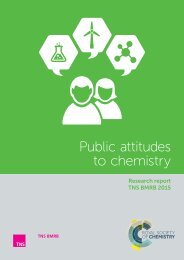JADE
1Plf2Lt
1Plf2Lt
You also want an ePaper? Increase the reach of your titles
YUMPU automatically turns print PDFs into web optimized ePapers that Google loves.
6 | <strong>JADE</strong><br />
EDITORIAL COMMENT | 7<br />
PAUL TROWLER<br />
The key question for me is: is it realistic to expect that systemic<br />
change at the institutional or even national level can be brought<br />
about by interventions aimed at individuals? Without an<br />
understanding of the nature of social practices I think it is unrealistic<br />
to have such an expectation, and my talk offered some examples<br />
from another context, South Africa, to illustrate this.<br />
At the same time I wanted to challenge accounts at the other<br />
end of the scale, ones based on structuralist ideas in which<br />
individuals simply act out social conventions. I used the example<br />
of the early academic tribes and territories research to illustrate<br />
such an approach. In contrast, an understanding of social reality,<br />
social change and enhancement sees both agency and structure in<br />
operation. Researching contexts of change from this perspective<br />
raises new challenges and new opportunities, and I briefly explored<br />
these.<br />
The talk was based on research which set out most fully in the<br />
following five publications:<br />
• Trowler, P. (2008) Cultures and Change in Higher Education:<br />
Theories and Practices. London: Palgrave Macmillan.<br />
• Trowler, P., Saunders, M. and Bamber, R. (Eds) (2012) Tribes and<br />
Territories in Higher Education: Practices in the 21st Century.<br />
London: Routledge.<br />
• Trowler, P. (2013) Depicting and Researching Disciplines:<br />
Strong and moderate essentialist approaches. Studies in<br />
Higher Education, 39, 10, 1720-1732.<br />
• Trowler, P. (2013) Practice-focused ethnographies of Higher<br />
Education: Method/ological corollaries of a social practice<br />
perspective. European Journal of Higher Education, 4, 1, 18-29.<br />
• Trowler, P., and Ashwin, P. and Saunders, M. (2014) The role<br />
of HEFCE in teaching and learning enhancement: a review of<br />
evaluative evidence. York: HEA. http://tinyurl.com/owjovau<br />
The slides from the talk are available here:<br />
http://tinyurl.com/o3uwoox<br />
EDITORIAL COMMENT<br />
Title<br />
A Keele Perspective on Prof. Trowler’s<br />
Visit<br />
Author(s)<br />
Jonathan Parker<br />
Contact<br />
j.parker@keele.ac.uk<br />
School<br />
School of Politics, Philosophy,<br />
International Relations and Environment<br />
Faculty<br />
Faculty of Humanities and Social<br />
Sciences<br />
Abstract<br />
Group work under problem-based<br />
learning environments are pivotal in<br />
promoting communication, cooperation,<br />
and coordination among students<br />
learning about and/or devising<br />
solutions for practical issues. Such<br />
learning and teaching practices are<br />
sometimes evaluated through group<br />
work assessments. While group work<br />
assessments encourage experiential<br />
learning and sharing of varied skills, views,<br />
arguments, agreement and disagreements<br />
among the students, it is also dubbed as<br />
a technique favouring low performing<br />
and dis-crediting top performing<br />
students. We compared group work and<br />
individual assessment performance of<br />
students in distance learning and a face<br />
to face delivery modules to elucidate<br />
the pro and cons of group assessment<br />
associated with problem-based learning<br />
and teaching practices. The overall mean<br />
score of group assessments were within<br />
the range of individual scores; however,<br />
the variance of the group assessment<br />
was more constrained than the variance<br />
of the individual performance. In this<br />
paper we discuss the implications of this<br />
constrained variance of group assessment<br />
for the practice of problem-based learning<br />
environments<br />
Keywords<br />
Group assessments, problem-based<br />
learning, assessment diversity, student<br />
performance<br />
Professor Paul Trowler’s talk Researching for enhancement<br />
in higher education: Beyond structuralism and individualism<br />
explored the ontological and epistemological challenges to<br />
researching and understanding policy in higher education,<br />
particularly concerning teaching excellence. His work, most<br />
widely known through Tribes and Territories in the 21st Century,<br />
consistently challenges the more extreme positions taken by<br />
structuralism and individualism (which might also be called<br />
institutionalism and interpretivism in my own field of politics<br />
and public policy) and seeks to find ways to use the insights of<br />
both approaches to research and understand higher education.<br />
The presentation focused upon a case study in South Africa<br />
(referred to as a ‘site ontology’), in which two law faculties, one<br />
traditional and largely white and one new and largely black,<br />
were to be merged. The case interviews the staff and students<br />
to compare their views of what was happening. It embedded<br />
these individual accounts in the institutional histories and<br />
contexts, as well as the wider social history of the country to<br />
try and illuminate the complexities and constraints that affected<br />
these individuals.<br />
This talk examined the more individualistic approaches to<br />
teaching excellence that tend to dominate discussions in higher<br />
education such as the ‘reflexive practitioner’ that assumes that<br />
good practice can be spread by example through ‘contagion’<br />
processes. Professor Trowler challenged whether these<br />
individual approaches would be sufficient to create systemic<br />
change and called for more awareness of power relationships<br />
and how these practices interact with more structural<br />
(institutional) factors.<br />
This call for seeking more balanced approaches to policy<br />
research is very timely. The move to more market based higher<br />
education is bringing a host of changes that deeply impact<br />
learning and teaching practices. The government is consulting<br />
on widespread reform of quality assurance, the REF, and the<br />
NSS, not to mention the TEF. The expressed intent of these<br />
changes is stated as seeking to better balance the imperatives<br />
of research and teaching in the system to make teaching and<br />
equally esteemed and rewarded part. The shape and impact of<br />
these reforms remain to be seen.<br />
It should be noted that previous reviews of higher education,<br />
such as the Dearing Report (1997), the Brown Review (2010)<br />
and subsequent 2011 white paper titled ‘Students at the Heart<br />
of the System’ are littered with similar unfulfilled expectations.<br />
The globalisation of league tables and funding tied to the REF<br />
are institutions that have driven university priorities strongly




